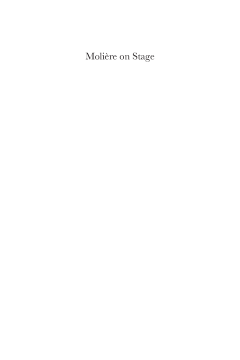
Additional Information
Book Details
Abstract
What happens when the dramatic art of Molière is unleashed onto the stage and explodes into new life? ‘Molière on Stage’ takes the reader onstage, backstage and into the audience of Molière’s plays, analyzing the performance of his works in both his own time and ours. Written by a professional stage director with over fifty years of experience directing and translating Molière, this original, in-depth study allows the reader to see how the playwright’s lines have been brought to new life on stage throughout the centuries.
The text explores how Molière strove to create a communal experience of shared laughter that fulfilled the universal need for union, and focuses on four key topics: the elements of Molière’s early life that are evidenced in his later theater works; his great central plays that focus on love and lust; his comedic genius and his passion for the theater; and the final words and performances of his vivid and exceptional life. Inspired by the actions of the great French masters, the text pays homage to the interpretations of Molière offered by the playwright himself, Louis Jouvet, Jacques Copeau and Jean-Louis Barrault, as well as those staged by American actors and directors such as Ron Leibman, Stephen Epp, Steven Wadsworth, Robert Falls and the author.
‘Molière on Stage’ takes the reader onstage, backstage and into the audience of Molière’s plays, analyzing the performance of his works in both his own time and in ours. Written by a professional stage director with over fifty years’ experience directing and translating Molière, this text explores how the playwright strove to create a communal experience of shared laughter, and investigates four key topics relating to this achievement: Molière’s early experiences that lead to his later theater experiences; his central great plays of love and lust; his comedic genius and his passion for the stage; and the final words and performances of his life.
Robert W. Goldsby is a retired professor and chairman emeritus at the Department of Theater, Dance and Performance Studies, University of California, Berkeley.
“Robert Goldsby has outdone scholarship by perceiving Molière’s plays in multiple dimensions: as the actor prepares, rehearsing them over and over again; in the mind’s eye, with fertile imagination; and in stagings reconstructed, past and present, here and abroad, and in various translations, including his own. It’s hard to conceive of any study of Molière so encompassing, so informed by intimacy with the texts.” —Professor Herbert Blau, University of Washington
“[T]his is a book for the theatre practitioners and for anyone looking to understand why Molière is one of the top classic playwrights—one who deserves the kinds of staging that Goldsby shows us.” —Felicia Hardison Londré, “Theatre History Studies”
“Goldsby has filled a significant need in Molière studies, and has done so in an accessible and entertaining manner. Fans as well as serious students of Molière now have a new and exciting resource, and actors and directors of the French comic master should reap great benefits as well.” — Michael Schwartz, stagemagazine.org
“Goldsby’s unique book blends profound scholarship sustained over a long lifetime, with decades of practical experience working with the texts in the theatre and an incomparable sense of personal affinity for its main subject. From now on, anyone reading or performing Molière’s plays will be grateful for this startling book.” —Dr Lissa Tyler Renaud, co-editor (English) of ‘Critical Stages/Scènes critiques’
“In this compelling analysis of exceptional French and American productions, including some of his own, Goldsby draws on personal experience gained from 50 years of studying, translating, and directing Molière. He pays homage to both world-renowned directors – Copeau, Jouvet, Mnouchkine – and less familiar professionals, e.g., Robert Falls and Ron Leibman. By revealing the pure gold found in live theater, Goldsby proves that time does not diminish the laughter of true comedy. Summing Up: Essential” —C. B. Kerr, Vassar College, “Choice”
